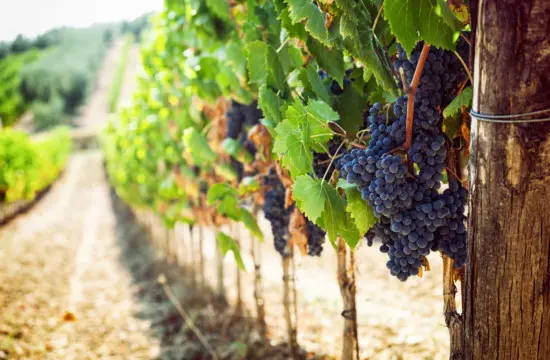For Andis Applewhite, owner of Half Circle Cross Vineyard, in northwest Texas, the issue of herbicide drift became a serious concern in 2016 when she first planted and remains an ongoing threat. Applewhite grows cabernet franc wine grapes, requiring less water than other regional crops, are a hearty variety and are economically appealing. However, she has seen poor performance of her vines due to injury from neighboring grower’s herbicide applications throughout the season, leaving them smaller and greatly reducing grape production.
“I want these vines to do well. My great grandfather bought this farm in 1903,” Applewhite said. “It’s not a hobby for me. I want to improve on my production quality and plant more acres, but I have been holding off until there is a solution to this drift problem and the crop damage it causes.”
“Some growers do not spray to label. They are not attentive to wind, weather, timing and other issues to consider before spraying herbicide.”
Growth of her vines was slow and reduced by about one-third of where they should be according to her crop advisors. For help, Applewhite reached out to neighboring friends, growers and retailers to get her vines started, and for ongoing input management. In August of 2018, she was introduced to CROP+, a foliar nutritional supplement designed to support plant tolerance to abiotic stress. She made two late in-season applications of the technology to the vines showing the signs of herbicide drift exposure: burn, leaf cupping, deformation and stunted growth, and one pre-dormancy application. After her applications of CROP + last year, Applewhite’s vines are showing greater flowering, more flower sets, and signs of new growth than in the previous years.
“CROP+ reduced the impact of the herbicide drift, with more buds and flowers visible than seen previously,” said Applewhite. “I intend to make more applications of CROP+ this season and continue evaluating the results.
Applewhite is also concerned about nutrition in season. “We’ve received a lot of rain this year, about 6.7 inches in a short window,” said Applewhite. “The fact that CROP+ contains a healthy amount of zinc is important for improved nutrient uptake.”
“The multi-disciplinary approach is something that sets CROP+ apart from other technology and give plants, whether they’re a specialty crop like wine grapes in Texas, or corn and soybeans in Iowa, the best chance to get through harsh climate conditions and better tolerate other threats like herbicide drift,” according to Ron Delfs, Business Manager for CROP+ in the US.
“The technology in CROP+ maximizes genetic potential by activating a plant’s metabolic pathways and has several modes of action that impact photosynthesis, nutrient uptake, antioxidant activity and genes involved in plant responses to stress,” Molly McGrath, Ph.D., Technical Development Manager for Verdesian Life Sciences. “It is widely understood that the impact of stress is generally negative for crops. Reduced root growth and nutrient tends to reduce yields. Boosting a plant’s ability to overcome stressors with a product like CROP+ results in better performance that can minimize yield loss.”
As part of Verdesian Life Science’s specialized Nutrient Use Efficiency or NUE grower solutions, CROP+ technology is specifically designed to help growers produce more resilient, healthy plants during critical stages of phenological development, capable of withstanding both abiotic and herbicide stressors throughout the season. Patented by Cytozyme Laboratories, CROP+ chemistry contains biologically derived nutritional supplements, fermentation metabolites, naturally chelated micronutrients, plant extracts and natural adjuvants to aid in plant photosynthesis, impact key metabolic pathways, nutrient uptake and the reduction of destructive free radicals generated during stress conditions. CROP+ is widely used across the globe in China, central and South America.


